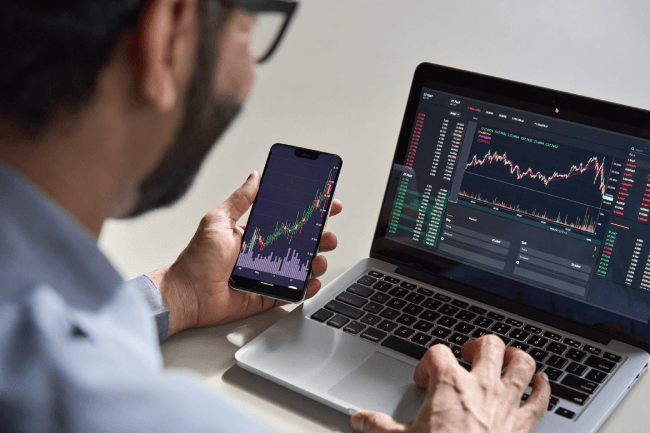Brokerage Calculator
Find out exact brokerage and compare your broker’s charge before investing in the stock market. Explore our online brokerage calculator to get a complete overview of your trade.
Open Free Demat Account
*T&C ApplyCalculate Your Brokerage Here
Equity Delivery
TurnOverP&LBrokerageSTT/CTTTransaction ChargesIPFT ChargesSEBI ChargesGSTStamp ChargesDP chargeTotal Tax and chargesNet P&LEquity Intraday
TurnOverP&LBrokerageSTT/CTTTransaction ChargesIPFT ChargesSEBI ChargesGSTStamp ChargesClearing ChargesTotal Tax and chargesNet P&LEquity Futures
TurnOverP&LBrokerageSTT/CTTTransaction ChargesIPFT ChargesSEBI ChargesGSTStamp ChargesClearing chargeTotal Tax and chargesNet P&LEquity Options
TurnOverP&LBrokerageSTT/CTTTransaction ChargesIPFT ChargesSEBI ChargesGSTStamp ChargesDP chargeTotal Tax and chargesNet P&L
Currency Futures
TurnOverP&LBrokerageSTT/CTTTransaction ChargesSEBI ChargesGSTStamp ChargesDP chargeTotal Tax and chargesNet P&LCurrency Options
TurnOverP&LBrokerageSTT/CTTTransaction ChargesSEBI ChargesGSTStamp ChargesDP chargeTotal Tax and chargesNet P&L
What is a Brokerage Calculator?
Before knowing about a brokerage fee calculator, you must be aware about the brokerage charges, it is the amount that you need to pay to the broker when you undertake a trade through the same broker platform. A brokerage fee calculator helps you to compare brokerage for trade such as commodities, equity etc.
A brokerage calculator gives you details about the transaction charges, state-wise stamp duty, GST charges, Securities Transaction Tax (STT) etc. In the brokerage calculator online, you need to add the buy price or sell price, along with the number of shares that you want to trade with and at last the stock exchange where you are trading.

Factors Influencing Brokerage Charges
An online brokerage calculator is a vital tool for your online trading. There are several factors you need to know before using a brokerage calculator.
Buying price/ Selling price
The buying price and selling price of a financial asset is a crucial part for brokerage calculations. Both prices can affect the calculator of the stock brokerage.
Volume of Transaction
The volume of trade refers to the number of shares you are going to trade. The volume affects the brokerage charges. Where if the volume is high the brokerage charges seem to be lower, and it is based on the percentage fee.
Types of trade
The charges for intraday trade, futures and equity trade are different. Share India offers intraday, F&O trade for Rs.20 or 0.03% whichever is lower.
Broker
In India you can have two type of broker which are as follows:
Full Service broker: A full service broker offers research, sales management, advice and provides all types of brokerage service. The fees of full-time service brokers are quite high.
Discount brokers: A discount broker provides a trading platform with low fees. The discount service broker provides limited service, where the focus is on the user who can independently do their own trade with a flat fee attached to it.
How is Brokerage Calculated?
Brokerage is a fee that brokers collect from traders to provide a facility or portal to fulfill their trading requirement. With the advent of online trading, users can trade in low brokerage and better technology.
Brokerage calculation = Number of shares bought/sold x price of one stock x brokerage percentage
This formula can be implied to both intraday as well delivery trading.
To understand the brokerage, consider an example of a trader who buys 100 shares for delivery trade at a buying price of Rs.500 and sells for Rs.1000.
Brokerage Charges:
| Charges | Amount |
|---|---|
| Turnover | 150000 |
| STT | 150 |
| Exchnage Txn Charges | 5.25 |
| GST | 8.17 |
| Clearing Charges | 0 |
| Stamp Duty | 0 |
| SEBI Charges | 0.15 |
| Brokerage | 40 |
| Total Charges | 203.14 |
How To Use a Brokerage Calculator?
Here are the steps to use a share market calculator:
Select trade type
Cash, Delivery, Intraday, F&O etc. Each has different brokerage rates.
Enter trade details
- Stock name or symbol
- Buy/sell
- Number of shares
- Price per share
Enter trade value
The calculator will automatically show the total trade value based on quantity and price per share.
Benefits of Online Brokerage Calculator
Using the online brokerage charges calculator will help you in several ways. The benefits of brokerage calculators is as follows:
Estimates trading costs:
A stock brokerage calculator gives you an estimate of the total brokerage charges and other costs like STT, stamp duty, etc. associated with a trade. This helps make informed investment decisions.
Analyzes different trading strategies:
You can use a calculator to estimate costs for different trading strategies like intraday, delivery, options, futures, etc. and determine which suits your trading.
Tracks expenses:
Calculators allow you to save your trade details and track brokerage and other costs over time. This helps monitor trading expenses & other ratios.
Compares broker costs:
The Brokerage calculators allow you to compare brokerage rates and fees across different brokers. This helps choose the most cost-effective broker.
Calculates breakeven points:
Brokerage charges calculators can help you determine the price point at which you will break even on a trade after considering costs.
Tax calculations:
Some stock brokerage calculators may also help estimate the capital gains tax to be paid on profitable trades.
Explore More Calculators
Latest Articles on Share Market
 02 Mar / 23
02 Mar / 23Decoding Animal Symbols in the Stock Market
As you go deep into stock trading, you may come across various aspects of the share market. Investors can come across trading, you may come across various aspects of the stock market.
 02 Mar / 23
02 Mar / 23Treasury Stocks: Meaning and Methods
The term “treasury stocks” is used to describe shares of a business’s stock that have been repurchased by the firm through a variety of strategies, including open market purchases, stock buybacks, or employee stock option exercises.
 02 Mar / 23
02 Mar / 23Understanding Defensive Stocks: An Overview
There are different types of stocks depending upon the performance of stocks. These stocks can be divided into categories depending on their fundamental and other factors.
